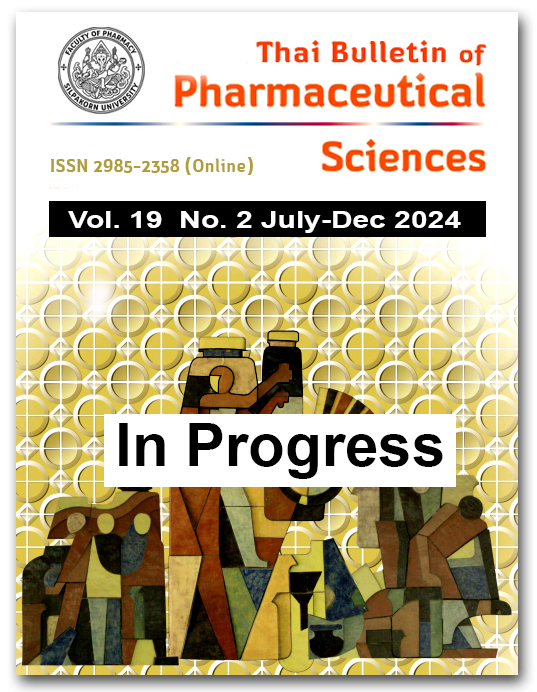DEVELOPMENT OF ADMISSION MEDICATION RECONCILIATION IN SONGKLANAGARIND HOSPITAL
DOI:
https://doi.org/10.69598/tbps.19.2.149-163Keywords:
medication reconciliation, medication discrepancy, medication errorAbstract
Hospitalized patients are prone to medication errors (MEs) which usually occur at transition points during care. Communication problems or the transfer of information between patients and healthcare professionals are among the causes of MEs. This study developed a medication reconciliation system with pharmacists who were specifically responsible for identification of medication discrepancy and intervention. This action research on patient admissions at Songklanagarind Hospital between October 2018 - September 2022 is divided into 4 phases: 1. Designed and developed medication reconciliation system with pharmacists in collaboration with a multidisciplinary team. 2. Conducted trial with one pharmacist and piloted it among patients with a previous history of using warfarin. 3. Developed medication reconciliation program. 4. Expanded the program to patients who are at risk of MEs by increasing the number of pharmacists to two. 70-78% of patients had medication reconciliation processed by a pharmacist within 24 hours of hospital admission. Pharmacists found MEs of 11-17%, with the most common being the incorrect dosage or frequency of medication (50-70%), followed by omission (15-45%). In 70-77% of the MEs, the medication did not reach the patient. Pharmacists have an important role in preventing MEs by reconciling medications. Through the medication reconciliation process, pharmacists can assess the completeness and accuracy of medication lists to reduce MEs and prevent those errors from affecting patients.
References
Rattanadatesakul J, Rattanadatesakul P. Medication error and utilization in drug management systems [Internet]. 2017 [cited 2023 Sep 19]. Available from: https://ccpe.pharmacycouncil.org/showfile.php?file=303%3B (in Thai)
Tam VC, Knowles SR, Cornish PL, Fine N, Marchesano R, Etchells EE. Frequency, type and clinical importance of medication history errors at admission to hospital: A systematic review. CMAJ. 2005;173(5):510-5.
Rozich J, Roger R. Medication safety: one organization’s approach to the challenge. J Clin Outcomes Manag. 2001;8:27-34.
Sripirom R, Rattanachodpanich T, Phumas P, Sakolchai S, Chantapasa K, Limwattananon S, et.al. Self-medication among Thai people by buying medicines from community pharmacy. J Health Sys Res. 2017;11(3):369-77. (in Thai)
National Institute for Health and Care Excellence. Medicines optimisation: The safe and effective use of medicines to enable the best possible outcomes [Internet]. 2012 [cited 2023 Sep 19]. Available from: https://www.ncbi.nlm.nih.gov/books/NBK305021/pdf/Bookshelf_NBK305021.pdf
Institute for Safe Medication Practice. Medication safety alert: Building a case for medication reconciliation [Internet]. 2005 [cited 2023 Sep 19]. Available from: https://www.ismp.org/resources/building-case-medication-reconciliation
Cornish PL, Knowles SR, Marchesano R, Tam V, Shadowitz S, Juurlink DN, et al. Unintended medication discrepancies at the time of hospital admission. Arch Intern Med. 2005;165(4):424-9.
Healthcare Accreditation Institute (Public Organization). Hospital and health service standards 5th edition [Internet]. 2022 [cited Sep 19, 2023]. Available from: https://backend.ha.or.th/fileupload/DOCUMENT/00148/77c77e3f-ed2f-41a9-90d4-22164a69a871.pdf (in Thai)
Tappawan U, Rungalamsin C, Tussanawiwat N. Prevention of drug discrepancies occurring at the service interface by means of medication reconciliation. Thai J Hosp Pharm. 2011;21(2):105-17. (in Thai)
Rattanadatesakul J, Rattanadatesakul P. Medication reconciliation by 3P (purpose-process-performance) [Internet]. 2018 [cited 2023 Sep 19]. Available from: https://ccpe.pharmacycouncil.org/showfile.php?file=469 (in Thai)
Gleason KM, Groszek JM, Sullivan C, Rooney D, Barnard C, Noskin GA. Reconciliation of discrepancies in medication histories and admission orders of newly hospitalized patients. Am J Health Syst Pharm. 2004;61(16):1689-95.
Puntakul, K Topark-Ngar A. Medication reconciliation at Nakhon Ratchasima Rajanagarindra Psychiatric Hospital. Isan J Pharm Sci. 2012;8(2):27-40. (in Thai)
Mekonnen AB, McLachlan AJ, Brien JA. Pharmacy-led medication reconciliation programmes at hospital transitions: A systematic review and meta-analysis. J Clin Pharm Ther. 2016;41(2):128-44.
Griese-Mammen N, Schulz M, Böni F, Hersberger KE. Medication review and medication reconciliation. In: Alves da Costa F, van Mil J, Alvarez-Risco A, editors. The pharmacist guide to implementing pharmaceutical care. Cham: Springer; 2019. p. 69-87.
National Coordinating Council for Medication Error Reporting and Prevention. What is a medication error? [Internet]. 2021 [cited 2023 Sep 21]. Available from: https://www.nccmerp.org/about-medication-errors
Chanatepaporn P, Anutchatchaval S, Nakornratanachai P. Development of medication reconciliation at the female-medicine ward in Srinagarind Hospital. Srinagarind Med J. 2014;29(3):276-82. (in Thai)
Saithai S, Wongpoowarak P. Outcomes of medication reconciliation at the female medical ward in a general hospital. Thai J Pharm Prac. 2013;5(1):1-15. (in Thai)
Mayachearw K, Wongpoowarak P. Effects of medication reconciliation process at surgical wards in a regional hospital. Thai J Pharm Prac. 2016;8(1):36-47. (in Thai)
Downloads
Published
How to Cite
Issue
Section
License
All articles published and information contained in this journal such as text, graphics, logos and images is copyrighted by and proprietary to the Thai Bulletin of Pharmaceutical Sciences, and may not be reproduced in whole or in part by persons, organizations, or corporations other than the Thai Bulletin of Pharmaceutical Sciences and the authors without prior written permission.



